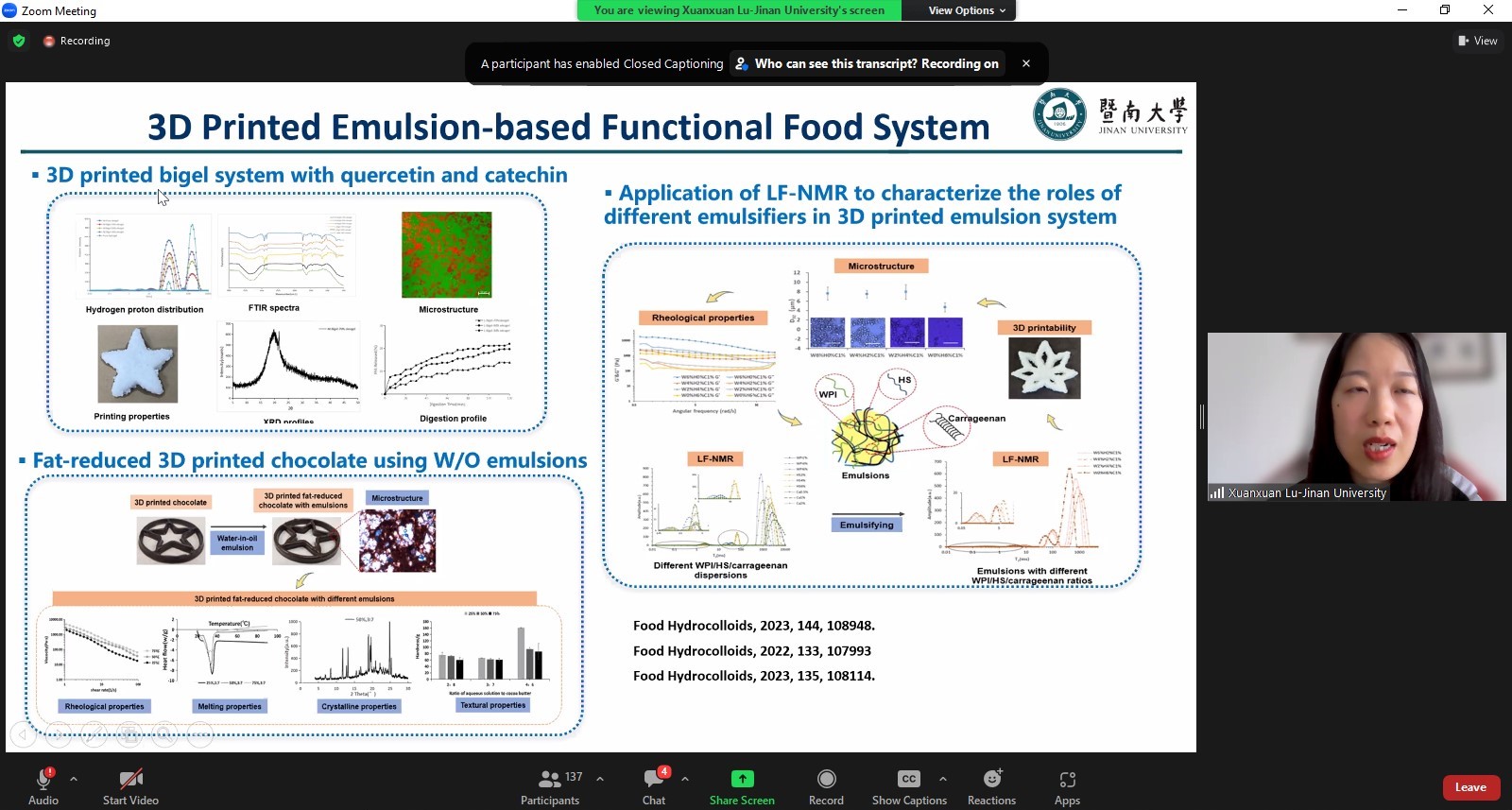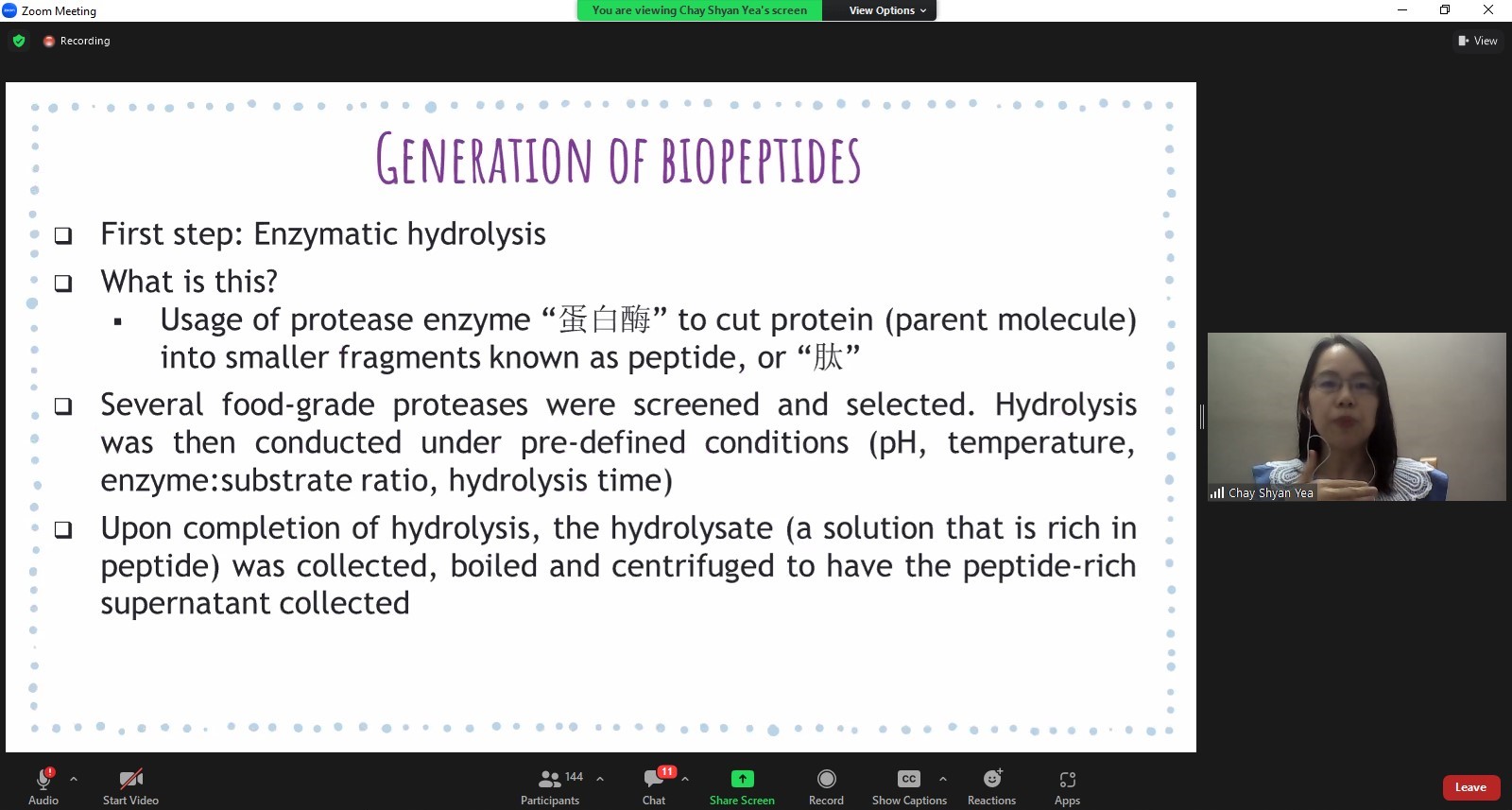
UTAR Faculty of Science (FSc), in collaboration with the Department of Food Science and Engineering of Jinan University (JNU), Guangzhou, China, successfully organised the annual JNU-UTAR Webinar Series on Food Science and Technology, on 23 October 2023 via ZOOM.

JNU-UTAR webinar series – Food Science and Technology
Aimed at disseminating the understandings of the underlying scientific principles, and broaden the general knowledge of food related issues, the webinar was moderated by Faculty of Science (FSc) Department of Agricultural and Food Science academic Dr Ong Mei Kying and JNU academic Dr Jiang Xinwei.


Dr Ong (left) and Dr Jiang
The webinar was attended by more than 140 participants from UTAR and JNU comprising researchers, staff and students, and public.



Dr Lu explaining pickering emulsions process
The first speaker was JNU academic Assoc Prof Dr Lu Xuanxuan, who spoke on “Milled Miscellaneous Black Rice Particles Stabilised Pickering Emulsions Delivery System”. Dr Lu highlighted, “The milled miscellaneous black rice particles stabilised pickering emulsions can serve as a novel and natural delivery system for various applications. Milled miscellaneous black rice particles refers to black rice that has been processed into small particles through milling. Black rice is a type of rice that is dark in colour due to its high anthocyanin content, which also makes it a good source of antioxidants.”
She explained, “Stabilised pickering emulsions are a type of emulsion, a mixture of two immiscible liquids, like oil and water stabilised by solid particles instead of traditional emulsifiers. In this context, the milled black rice particles are serving as the stabilising agents for the emulsion. This refers to the use of the emulsion as a vehicle to deliver certain substances or compounds to specific targets.”
Dr Lu added, “In food industry, this emulsion system can be used to encapsulate flavours, colours, or nutrients, allowing them to be evenly dispersed in food products. The use of milled black rice particles as stabilisers is interesting because it’s a natural and potentially healthier alternative to synthetic stabilisers or emulsifiers. The specific properties and potential applications of this system would depend on the size and characteristics of the milled black rice particles, the nature of the emulsion, and the intended use.”
She concluded, “Milling is an easy, efficient, and “green” strategy to modify black rice as complex particulate emulsifiers for formation of pickering emulsions with antioxidant functionality. Pickering emulsions stabilised by milled black rice could possess health benefit effects due to existing of intrinsic phenolics, which were gradually released during digestion and colonic fermentation. Pickering emulsions stabilised by milled black rice has prebiotic potential, showing high advantage in colon-targeted delivery of bioactive substances.
The next speaker, FSc academic Dr Chay Shyan Yea, spoke on “Biopeptides with Blood-pressure Lowering Efficacy”.



Dr Chay explaining the potential of winged bean to produce peptides that has blood pressure lowering efficacy
She enthused, “Biopeptides with blood pressure lowering efficacy are of interest in the field of medicine and nutrition, especially for individuals with hypertension or those looking for natural ways to manage their blood pressure. Biopeptides are short chains of amino acids with various biological activities, including their potential to affect blood pressure.”
In her research she used winged bean, a tropical legume that has gained attention for its potential health benefits, including its seeds, which contain various bioactive compounds. Some plant-derived peptides have shown promise in various health applications, such as antioxidant, antihypertensive, and antimicrobial properties. Her research suggests that the peptides derived from winged bean may have potential antihypertensive properties.
Dr Chay concluded, “Winged bean seed, upon enzymatic hydrolysis, was able to release peptides with ACE inhibitory activity. One peptide sequence identified from the seed was proven to be able to reduce blood pressure. Winged bean seeds hydrolysate was able to reduce blood pressure, setting ground for further exploration as functional food ingredient to be consumed on a daily basis to achieve blood pressure regulation.”
Food science and technology is a multidisciplinary field that combines principles of chemistry, biology, microbiology, engineering, and other sciences to study the composition, processing, preservation, and safety of food products. It plays a crucial role in ensuring the production of safe, nutritious, and palatable food for consumers.
The webinar ended with a Q&A session from the participants and a virtual group photograph.
© 2023 UNIVERSITI TUNKU ABDUL RAHMAN DU012(A).
Wholly owned by UTAR Education Foundation (200201010564(578227-M)) LEGAL STATEMENT TERM OF USAGE PRIVACY NOTICE